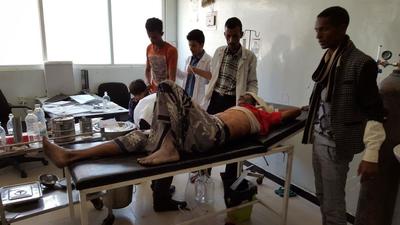Médecins Sans Frontières/Doctors Without Borders (MSF) is providing urgently needed medical care and water and sanitation in western Uganda, following an influx of tens of thousands of refugees fleeing insecurity in North Kivu, Democratic Republic of Congo, in mid-July.
Around 22,000 refugees are now living in the Bubukwanga transit camp, 18 kilometres from the DRC border, in a space designed for only 12,500 people.
MSF is providing medical care including maternity healthcare, vaccinations and nutrition treatment, as well as working to improve a potentially dangerous water and sanitation situation.
Medical care is provided both to refugees and locals, reaching a total catchment population of 50,000 people.
Expanding services
Next week, MSF will begin offering medical care in the Kyangwali permanent camp where refugees are being transferred. The UN refugee agency (UNHCR) has so far transferred around 4,000 refugees from the transit camp to this permanent site and plans to continue transferring 2,000 each week.
The permanent camp is 150km away but the journey can take up to six hours and itself poses a risk for the refugees. Unfortunately yesterday one of the transfer buses crashed, killing one baby and injuring 24 other people.
The injured were transported in an MSF ambulance to a nearby hospital where MSF and other medical staff provided critical care.
Additionally, the number of refugees arriving at the transit camp has recently increased as the security situation deteriorates in DRC, with around 3,000 new arrivals last week.
Water and sanitation conditions
MSF remains concerned about the water and sanitation condition in the transit camp.
“Although the situation has improved in recent weeks, there are inadequate latrines, only one latrine for 82 people, that are full to overflowing, posing a serious risk of cholera, dysentery and shigellosis infections.
“Cholera is a big concern. It is an endemic area for cholera and the seasonal peak is always at the start of the rainy season,” said MSF Head of Mission, Ruben Pottier.
The rainy season has just begun, further increasing the cholera risk and reducing road access for the trucks that empty the latrines.
As well as constructing latrines and trucking in clean water, MSF has pre-positioned the medical supplies and equipment needed to respond to a cholera outbreak.
Healthcare for refugees
MSF is providing around 300 outpatient consultations each day in the transit camp, with peaks of 450 consultations, mostly for respiratory tract infections, malaria and diarrhoea. Teams have also provided assistance to survivors of sexual violence in the camp.
MSF is also supporting an inpatient department that has increased from 20 to 47 beds and includes a paediatric ward, adult ward and maternity ward.
“We’ve particularly scaled up capacity in sexual and reproductive health. In an emergency we should not forget that life goes on, women still give birth, and there is an urgent need for medical care for complicated deliveries.
“Our maternity unit can deal with complicated deliveries – we only need to refer for Caesareans – and since 22nd July we’ve delivered 92 babies.”
In the Kyangwali permanent camp, MSF is establishing a health unit in the refugee reception area.
From next week this will offer basic healthcare, referrals for patients requiring ongoing medical treatment and vaccination and malnutrition screening for children.
Children who started malnutrition treatment in the transit camp will be followed up to ensure their treatment continues.
MSF will continue to scale-up activities in both camps as more refugees arrive.
MSF in Uganda
MSF has worked in Uganda since 1986. In addition to responding to emergencies, MSF runs an HIV and TB treatment program in Arua.
Find out more about MSF’s work in Uganda





